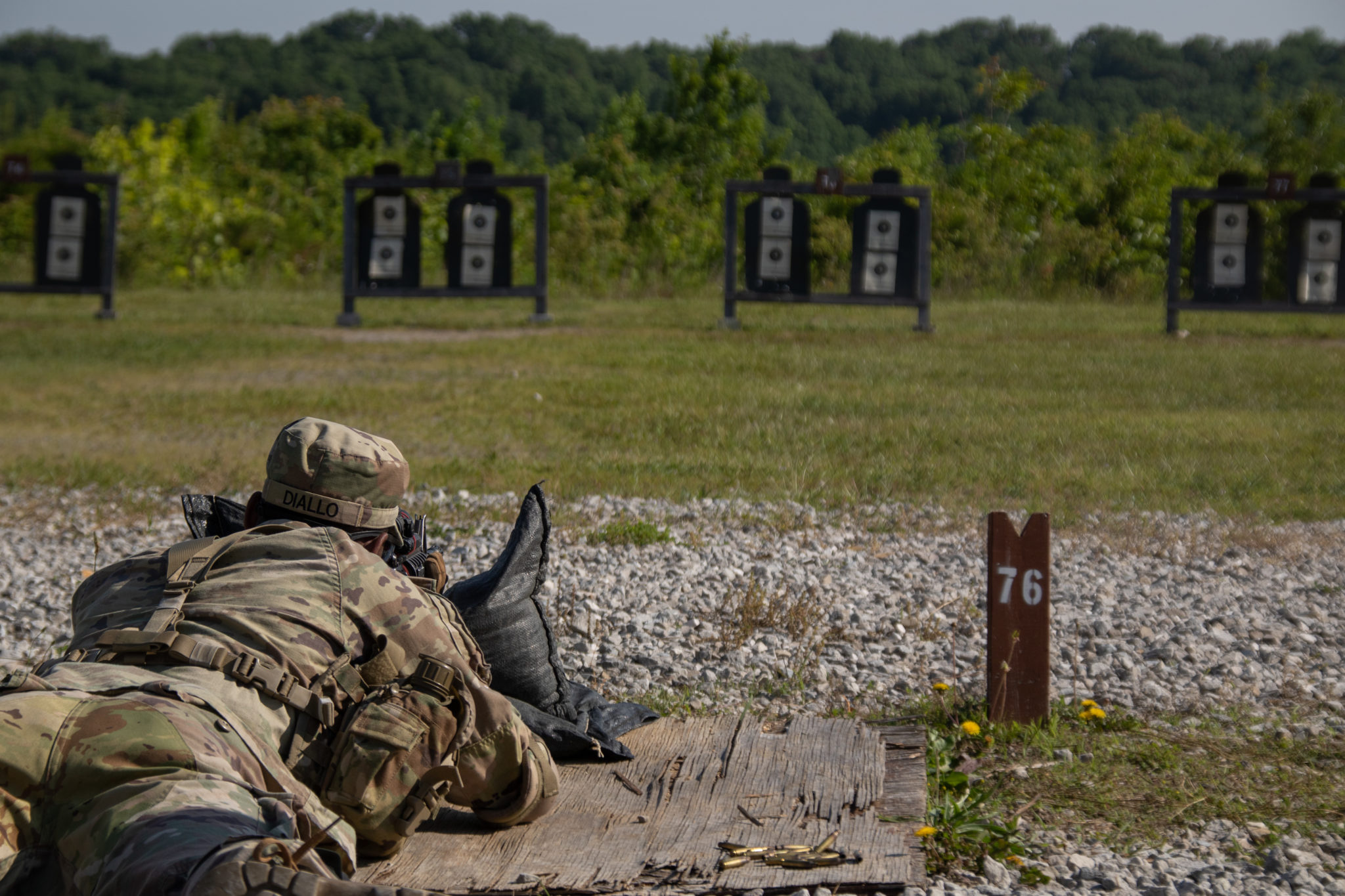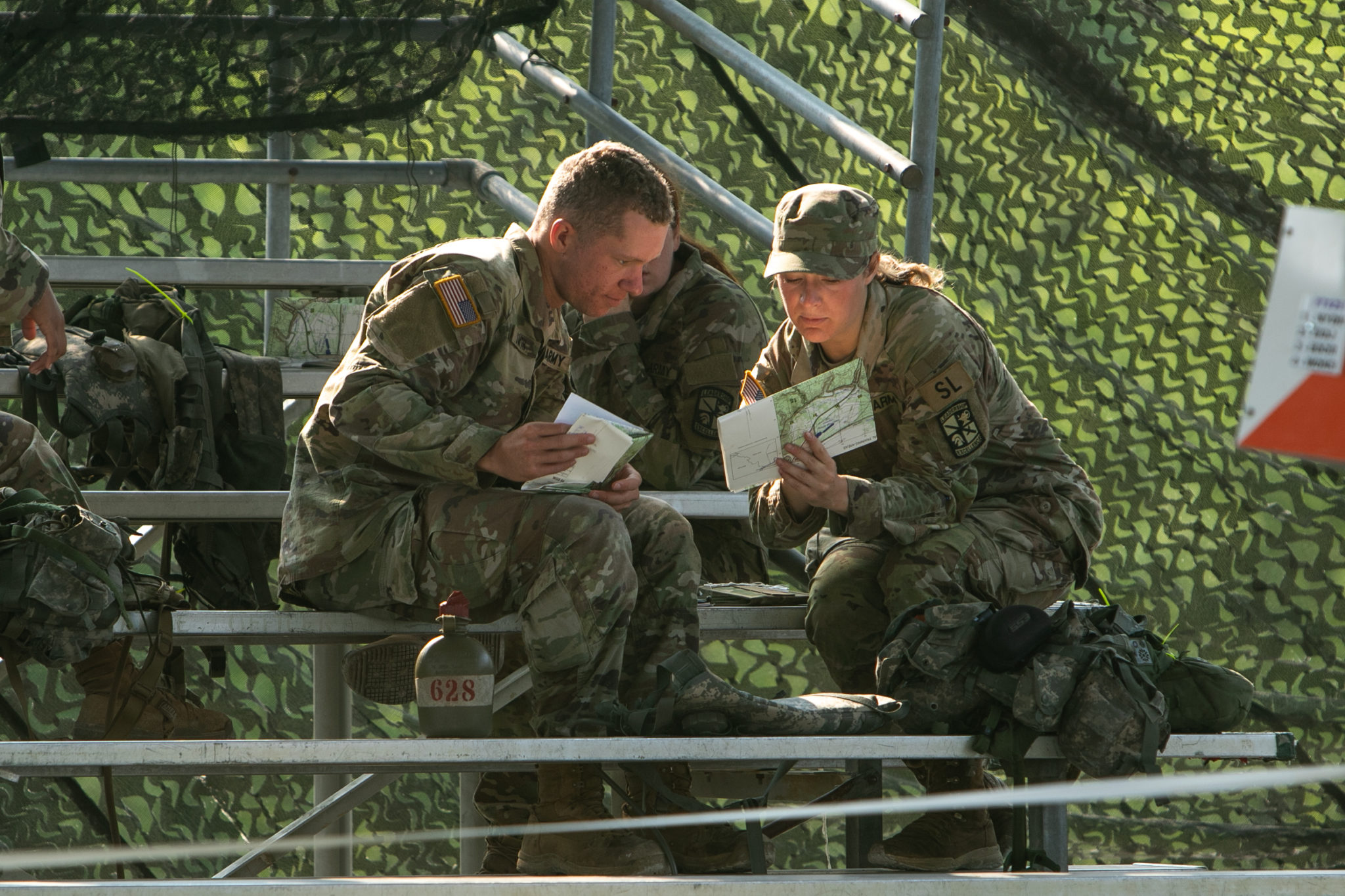Fort Knox, Ky., – One of the last steps of completing Cadet Summer Training is to return to the Central Issuing Facility where equipment is cleaned, inspected, and returned to the warehouse.
Advanced Camp 4th Regiment Cadets cleaned and processed their borrowed equipment at CIF in preparation for their departure from Fort Knox.

An Advanced Camp 4th Regiment Cadet scrubs eqipment at the Central Issuing Facility, July 8, Fort Knox, Ky. Cadets must return and clean equipment they have checked out, one of the last steps before graduating from Cadet Summer Training. (photo by Emily LaForme).
Cadet Christian Ramsay, student at Florida International University, native of Fort Lauderdale, Florida, returned his equipment at CIF without a hitch.
“Before you get to CIF you need to go ahead and clean your equipment as best as you can. You need to get any dirt, grime, anything that is not normally on it off, and then you need to make sure it is dry,” said Ramsay. “The things that tends to get people are the canteens, they tend to forget to take the rubber part off on the top and get that dry. It’s very thorough in your cleaning process, and when you get here you go through the line and turn everything in and they inspect it. If it’s good to go then you are good, and they sign off on it, and you’re basically free.”
Ramsay is looking forward to returning home, though he appreciates his time at CST.
“It’s a big relief. I had a great platoon, so training tended to fly by even though we were kind of struggling with things, like if the weight was a little heavy or whatever else,” said Ramsay. “There was one night where we got stuck in a huge thunderstorm. We all set up our hooches [poncho tent] where we could sleep for the night and protect ourselves from the rain. The next thing you know, everybody is in this giant river from the runoff. Instead of mad, we just started singing the Army Song, it was hilarious.”
Cadets need to be confident in their equipment when maneuvering tasks in the field.
“First and foremost, with field craft, you need to trust your equipment to keep yourself dry and wet weather bags to keep your equipment inside your rucksack dry. Also, with going to the rappel tower and confidence course, trusting the equipment and trusting the instructors that they taught you the right knots to keep you safe as your rappel down over 60 feet,” said Ramsay.

A 4th Regiment Advanced Camp Cadet hangs gear to dry after cleaning it for return at the Central Issuing Facility July 8, Fort Knox, Ky,. (photo by Emily LaForme).
Cleaning the equipment after long weeks of training can be daunting.
“Be very, very thorough. Don’t short change yourself. There were people that tended to procrastinate and said they would wait until the last minute to clean it and it was either still damp so they had to dry it with the big fans or they just didn’t clean it well enough. Just go the extra mile and clean it to the best of your ability so that way you don’t have to sit here in the warehouse x amount of time doing what you should have done days prior,” said Ramsay.
Ramsay equates functioning equipment with the level of success a Cadet will have in the field.
“Equipment is everything. You sign for it, then you use it, and you make sure it works, so that way you can accomplish your mission no matter how big or small,” said Ramsay. “If your canteen has got mold in it, you can’t use it and you can’t drink water, and you’ll become a heat casualty. If your rucksack starts to break down on you, you might have one strap instead of two and you’re slinging that thing around and it has about 50 to 60 pounds in there, and if it rains it gets heavier if you don’t have your wet weather bag on it. Your equipment is your success.”
Cadet Hayden Blankenship, student at Arkansas State University at Jonesboro, native of Arkansas, is ready to return home after a successful 31 days of training.
“It was difficult, very challenging, but I’m glad to go home and see my family,” said Blankenship. “Camaraderie was high, we really came together as a platoon. The most memorable thing is probably that shower after we came out of the field after four days, it was amazing.”
Blankenship thinks that his weapon is the most important piece of equipment he has in the field.
“The equipment is very important,” said Blankenship. “The rifle, your weapon, is your lifeline, it’s what you have to stay alive in a combat zone, so maintenance for it, keeping it clean, making sure it’s functioning, is important.”
Finding different hacks and ways to preserve equipment is useful in the hustle from training site to training site.

4th Regiment, Advanced Camp Cadets return to the Central Issuing Facility July 8, Fort Knox, Ky., to clean and check-in equipment they have borrowed for Cadet Summer Training. (photo by Emily LaForme)
“The Cadre taught us little tricks and we taught each other tricks, kind of like shortcuts. People lose canteens all the time, the Cadre showed us the knots to use to tie them up, that way you don’t lose canteens anymore. It’s simple stuff, but helps for maintaining your equipment,” said Blankenship.
Overall, CIF is a small stop on the way out of Fort Knox, but it can certainly be a pleasant experience.
“CIF was a lot better than I thought it would be. In prior service, my experience with CIF was very, very difficult. These guys didn’t hassle us, there were a few deficiencies, but we squared them away. I actually loved the civilians that work here, they are very, very nice,” said Blankenship.
Cadets will continue to out process and prepare for their upcoming graduation before their departure from Fort Knox and CST.




